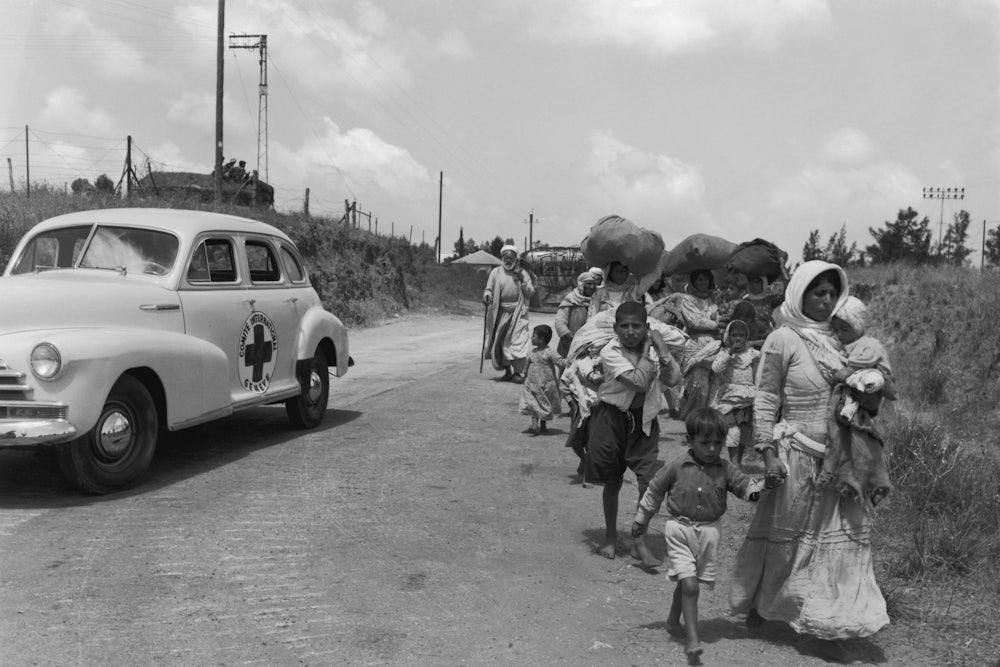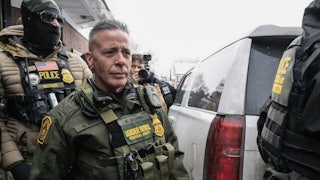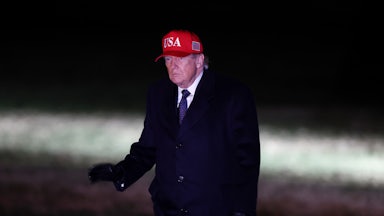My father, George Kuttab, and his mother, our Tata Nazira Fatalleh, fled their neighborhood of Musrara in what is now West Jerusalem in May 1948, after their sister Hoda’s husband, Elias, was killed by Zionist snipers in front of her and her children. They went to the Jordanian city of Zarqa and were later followed by my paternal uncle, Qustandi. Ammo (“uncle” in Arabic) Qustandi’s words, which became famous within our family and were repeated in our homes for years when he arrived in Zarqa, always brought smiles to our faces. Waving the metal key to the old homestead, he said: “I have locked the house with two clicks,” assuring his mom and my dad that their Jerusalem home was safe. It was not.
While we are not sure how our grandparents’ house was dealt with, we would later discover that the house was made available to Yemeni Jews. The flight of my father and his family was not unlike that of 750,000 Palestinians who were forced to become refugees in what we now call the Nakba, an Arabic word for disaster. May 15 of every year is remembered by Palestinians who lost their lands and homes at that time.
My uncle’s simple act and his hopeful words captured the heart of the Palestinian refugee tragedy: a people forced into exile but refusing to relinquish their right to return. For over seven decades, this longing has been passed from one generation to the next. But it is not merely nostalgia or poetry; it is about dignity, justice, and a people’s demand that their story not be erased.
Contrary to common belief, the right of return was never the deal-breaker in various Palestinian-Israeli talks, whether in Oslo, Camp David, or Taba. From my own personal work as a journalist and from reputable polling data, it is clear that if allowed to choose, the overwhelming majority of Palestinian refugees would prefer to stay where they are, move to a third country, or return to a future Palestinian state. Only a small minority insist on returning to what is now Israel. But the insistence on the right to return remains near-universal because it embodies a moral and legal recognition of the injustice endured.
Yet, as the chair of the U.N. Conciliation Commission for Palestine, the entity created in 1948 under U.N. Resolution 194 to mediate the Arab-Israeli conflict, the United States understood early on that Israel would never allow the refugees back. Instead, the Americans sought alternatives, notably through local integration of Palestinians in host countries. This gave birth to the U.N. Relief and Works Agency, or UNRWA, which was modeled after the Tennessee Valley Authority, aiming to provide employment and support services for the refugees.
UNRWA, conceived as a temporary agency by the United Nations General Assembly, was never given a set U.N. budget, and relied heavily on voluntary donor funding. Its original sin was embedded in its very name. The “works” in UNRWA referred to labor-intensive projects meant to integrate Palestinians economically in host countries, effectively shifting the focus away from the return guaranteed by Resolution 194 to resettlement, or tawteen.
Israel, which was admitted to the U.N. under Resolution 273 on the condition it would honor Resolution 194, has for decades evaded its responsibility. Instead, it left the burden of supporting over five million registered Palestinian refugees to UNRWA, while continuously undermining the agency. This reached a crescendo in 2018 when the first Trump administration, influenced by Israeli lobbying, slashed 30 percent of the agency’s funding.
Despite this, UNRWA remained a critical lifeline. It employed Palestinian refugees, ran schools and clinics, and provided hope. In places like Gaza and the West Bank, it represented more than relief; it was a symbol of the international community’s acknowledgment of the people’s plight. That is why Israel has long sought to dismantle it—because it embodies the Palestinian refugee narrative.
But dismantling UNRWA and denying that narrative will not make the refugee issue disappear. On the contrary, it ensures that the wound remains open. Refugee camps, chronically under-resourced and symbolically potent, have become centers of resistance. Movements like Hamas found fertile ground there, not because of ideology but because of the unaddressed pain of displacement.
There is, however, a path forward. It starts with honesty. Israel must accept moral and historical responsibility for the refugee problem. Without this acknowledgment, no solution will gain traction among Palestinians. Recognition does not mean the literal return of millions to Israeli towns and villages, but it means recognizing that a wrong was done.
A 2003 poll by respected Palestinian pollster Khalil Shikaki showed that fewer than 10 percent of refugees want to return to their original homes in Israel. What most want is dignity, choice, and a fair settlement. This is why initiatives like the 1999 Ottawa Process, led by Canadian scholars and former diplomats, are worth revisiting. Their proposal is grounded in political reality and human dignity.
The Ottawa framework proposes a two-step solution: first, obtaining refugee buy-in to a peace process; and second, offering four choices for permanent residence: Remain in the current host country, move to a third country, relocate to the new Palestinian state, or for a limited number, return to Israel. Compensation and resettlement aid would accompany these options. In the subsequent Israeli occupation of the rest of Palestine and the transfer of Jewish Israelis to settlements illegally built in the West Bank, Palestinians have extracted similar resolutions that guarantee the right of displaced Palestinians to return to their homes in what will be the state of Palestine.
This approach, balancing the right to choose with political feasibility, offers a way to finally close one of the most painful chapters of the Palestinian-Israeli conflict. But it depends entirely on political courage. Until Israeli leaders are ready to acknowledge their role in the Nakba and allow for a real Palestinian state within the 1967 borders, the refugee problem will not go away. It will live on in memories, keys, and unfulfilled promises.
My father, having married my mother, a proud Jordanian from the city of Salt, returned to East Jerusalem. But after Israel occupied the West Bank in 1967, and with no Palestinian higher education institutions at the time, he accepted my mother’s idea of emigrating to New Jersey, where her sister had been living. After studying and graduating in the United States, I returned to Jerusalem, and have since commuted between Jerusalem and Amman, working in journalism.
We carry the stories of our families not to dwell on the past, but to shape a better future. That begins with truth, responsibility, and the courage to imagine peace rooted in justice.






